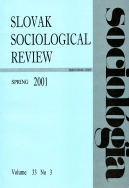A New Index of Democracy
A New Index of Democracy
Author(s): Christian W. HaerpferSubject(s): Social Sciences
Published by: SAV - Slovenská akadémia vied - Sociologický ústav
Keywords: Index of democracy; democratisation; mass public; post-communist countries; political transformation
Summary/Abstract: A New Index of Democracy. The Democratisation of the Mass Public in Five Central European Countries, 1991-1998. The analysis of political transformations in 5 post-Communist countries in Central Europe and the comparison with other post-Communist countries for the period between 1991 and 1998 showed that we cannot and we should not speak of one post-Communist Eastern Europe, which would imply a homogeneity of the process of democratisation of the region, but of very different regions within the former 'Soviet Bloc'. The paper identified four different regions, which display diverging patterns of political change. The first and most advanced region is 'Central Europe', including Poland, Czech Republic, Hungary, Slovenia and Slovakia. The second distinct region is the Balkan region, which encompasses Romania, Croatia, Bulgaria and the Federal Republic of Yugoslavia. The third post-Communist region, which crystallised in this paper, is the post-Communist 'Baltic's', including Estonia, Lithuania and Latvia. Finally, the fourth post-Communist region is the Commonwealth of Independent States (CIS), which includes Belarus, Ukraine and the Russian Federation. The basic feature of these four regions is that we do not find a convergence of patterns of political development, but a clear divergence of paths of political change across these four main post-Communist regions. The main innovation of this paper consists in the conceptualisation and development of an 'Index of Democracy' by the author, which for the first time enables comparative political science to measure with one single figure the extent and level of democratisation at the micro-level of political change, at the level of the post-Communist mass public in post-Communist Europe. The micro-analysis of the complex processes of democratisation, performed in this paper showed that Poland, the Czech Republic and Hungary can be already labelled as 'consolidated democracies', because more than 60 per cent of the mass public in these Central European countries are already 'democratic post-Communist citizens'. A clear-cut majority of the mass public is also democratic in Slovenia and Slovakia; especially Slovenia is very close to the position of a consolidated democracy. The second level of democratisation is visible in post-Communist Balkans: Romania, Croatia and Bulgaria can be characterised as 'emerging democracies', because in all three Southern European countries more than 50 per cent of the population can be described as democrats, which is well beyond the threshold of 40 per cent Democrats for the type of emerging democracies. Serbia-Montenegro is a deviant case in Southern Europe; it is a transforming society with an uncertain outcome regarding the democratisation at the micro-level. In the Baltic region, only Estonia fulfils the criteria for an emerging democracy with a share of 46 per cent Democrats, whereas Lithuania and Latvia are transforming societies, where democracy is only one .....
Journal: Sociológia - Slovak Sociological Review
- Issue Year: 2001
- Issue No: 3
- Page Range: 251-274
- Page Count: 24
- Language: English

